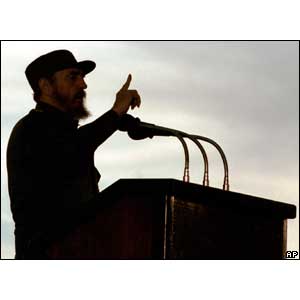
Cuba, the only communist country of Latin America has been governed for more than 40 years by only one president: Fidel Castro.
Today Fidel Castro, 80 years old and in delicate health, has transferred the powers to his brother
The Cuban revolution began in the year 1959, and since 1962 the U.S. organized a commercial blockade, while the government of the island sought the support of the USSR.
Since the USSR has disappeared, the government of Castro has intensified its actions against its political adversaries, and even also against some collaborators who are viewed as too moderate, such as former Foreign Minister Roberto Robaina.
The government condemned the opposition and arrested 74 dissidents, which was criticized by the European Union (E.U.).
The governments of Brazil and Venezuela financially support the Cuban government, as has China since the visit of the President Hu Jintao in the year of 2004.
An analysis of the actions of the Cuban government turns up the following keywords: revolution, repression, prison sentence, sanctions, embargoes, and dissident. Now the key question is, with Raul Castro will these intolerant words continue appearing, or will there be changes?
The future of Cuba is uncertain, because first one must evaluate the new functions of Raul Castro (the brother).
Nevertheless, Fidel's illness is big news, and almost all the newspapers and TV channels are closely following this political drama.
©2006 OhmyNews
by Alfredo Ascanio
Un artíoculo muy largo pero muy completo acerca de Fidel,la revolución y los grupos de apoyo, y escrito NEW YORKER por Jon Lee Anderson con el título : can the revolution outlive its leader? (Podrá la revolución sobrevivir a sus líderes? ) aparece en seguida:
No hay comentarios.:
Publicar un comentario